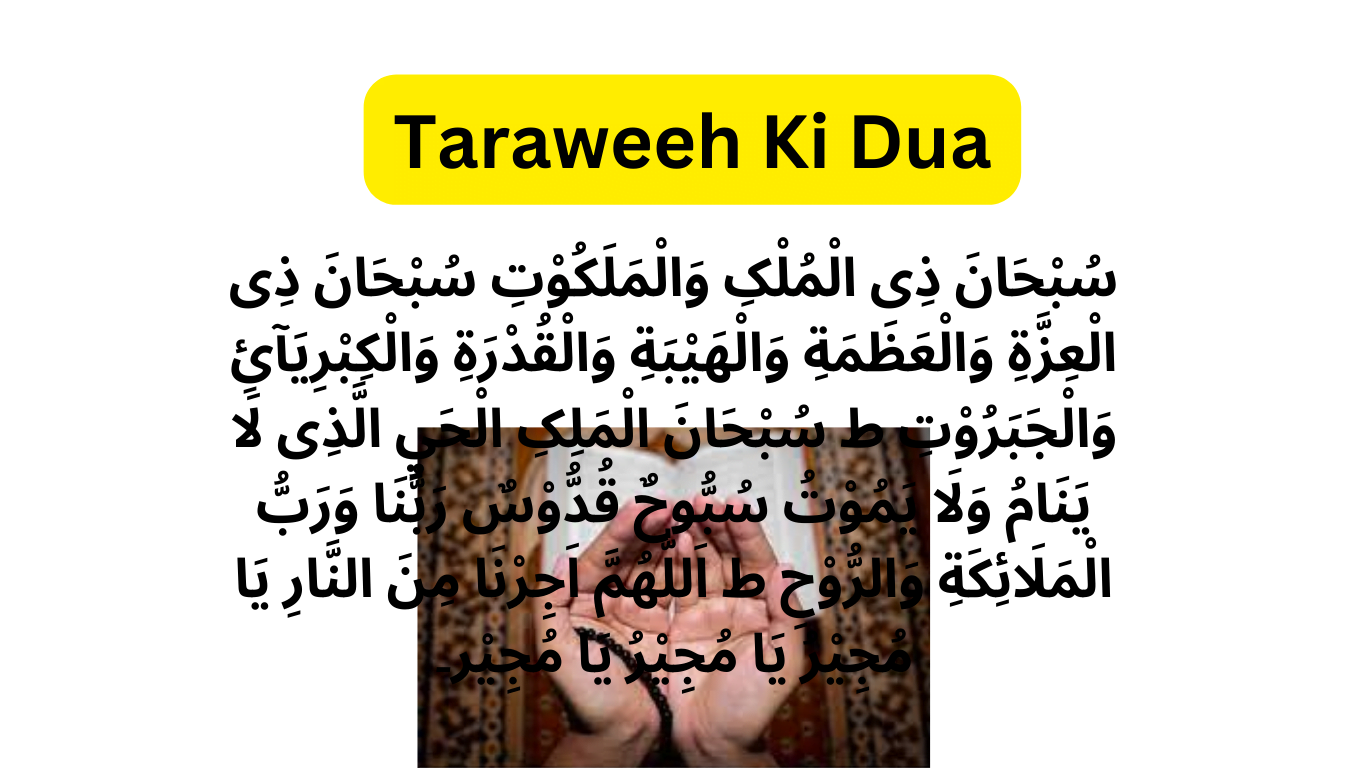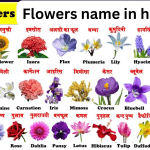Ramadan, the holy month in Islam, is a time of deep spiritual reflection and increased devotion. Among the various rituals observed during this sacred period, Tarawih prayers hold a significant place. An essential aspect of these prayers is the recitation of Taraweh ki Dua, a supplication that adds a layer of spiritual connection to the act of worship.
Taraweeh Dua, also known as the Taraweeh prayer supplication, holds significance among Muslims. This prayer is specifically recited during the Taraweeh ritual in the sacred month of Ramadan. It serves as a heartfelt appeal to Allah for blessings, forgiveness, and guidance. The term “Dua” refers to a supplication or prayer, and “Taraweeh” designates the distinctive prayer observed in Ramadan. Consequently, Dua e Taraweeh signifies the supplication recited during the Taraweeh prayer.
Dua e taraweeh after every 4 rakats In arabic:

سُبْحَانَ ذِی الْمُلْکِ وَالْمَلَکُوْتِ ط سُبْحَانَ ذِی الْعِزَّةِ وَالْعَظَمَةِ وَالْهَيْبَةِ وَالْقُدْرَةِ وَالْکِبْرِيَآئِ وَالْجَبَرُوْتِ ط سُبْحَانَ الْمَلِکِ الْحَيِ الَّذِی لَا يَنَامُ وَلَا يَمُوْتُ سُبُّوحٌ قُدُّوْسٌ رَبُّنَا وَرَبُّ الْمَلَائِکَةِ وَالرُّوْحِ ط اَللّٰهُمَّ اَجِرْنَا مِنَ النَّارِ يَا مُجِيْرُ يَا مُجِيْرُ يَا مُجِيْر۔
Dua e taraweeh after every 4 rakats Translation in English:
“Exalted is the Possessor of the hidden and the manifest dominion. Exalted is the Possessor of Might, Greatness, Reverence, Power, Pride, and Majesty. Exalted is the Master, the Living, the one who neither sleeps nor dies. All-perfect, All-holy, Our Lord, and the Lord of the angels and the souls. O Allah, grant us refuge from the Hellfire. O Granter of refuge, O Granter of refuge, O Granter of refuge.”
Dua e taraweeh in English:
Subhanal Malikil Quddus
Subhana dhil Mulki wal Malakuti;
Subhana dhil izzati wal aDhmati wal haybati wal Qudrati;
wal kibriyaa i wal jabaroot;
Subhanal Malikil hayyil ladhi, la yunaamu wa layamutu;
Subbuhun, Quddusun, Rabbuna Rabbul malaa ikati war-rooh;
Allahumma Ajirnee Minan Naar;
Ya Mujeero, Ya Mujeero, Ya Mujeer.
Taraweh ki Dua In Hindi:
“छिपे और प्रकट प्रभुत्व का स्वामी महान है। पराक्रम, महानता, श्रद्धा, शक्ति, गौरव और ऐश्वर्य का स्वामी ऊंचा है। महान है स्वामी, जीवित, वह जो न सोता है और न मरता है। सर्व-सिद्ध, सर्व-पवित्र, हमारे भगवान, और स्वर्गदूतों और आत्माओं के भगवान। ऐ अल्लाह, हमें जहन्नम की आग से पनाह दे। हे शरणदाता, हे शरणदाता, हे शरणदाता।
Taraweh ki Dua In urdu:
وہ پاک ہے جو بادشاہی اور بادشاہی کا مالک ہے، وہ پاک ہے، جلال، عظمت، عظمت، طاقت، غرور اور طاقت، پاک ہے بادشاہ، وہ زندہ ہے جو نہ سوتا ہے نہ مرتا ہے، وہ پاک ہے، پاک ہے اے ہمارے رب، اور فرشتوں اور روحوں کے رب، اے اللہ ہمیں آگ سے بچا، اے مددگار، اے مددگار، اے عطا کرنے والے۔
Taraweh ki Dua In Bangla:
আধিপত্য ও রাজ্যের প্রভু মহিমান্বিত তাঁরই মহিমা, মহিমা, মহিমা, মহিমা, শক্তি, অহংকার এবং শক্তি। , আমাদের পালনকর্তা, এবং ফেরেশতাদের এবং আত্মার পালনকর্তা, হে আল্লাহ, আমাদেরকে আগুন থেকে রক্ষা করুন, হে সাহায্যকারী, হে সাহায্যকারী, হে দাতা।
Why is important tarawih ki dua
Taraweeh is a special night prayer performed by Muslims during the month of Ramadan, the holy month in the Islamic calendar. The Taraweeh prayer is offered in congregation at night after the obligatory Isha prayer. The dua (supplication) recited during Taraweeh holds significance for several reasons:
- Spiritual Connection: The Taraweeh dua is an opportunity for Muslims to connect with Allah on a deeper spiritual level. It allows individuals to express their gratitude, seek forgiveness, and make personal supplications. This spiritual connection is particularly emphasized during the blessed month of Ramadan.
- Seeking Forgiveness: Ramadan is considered a month of forgiveness, mercy, and self-reflection. The Taraweeh dua often includes requests for forgiveness for any shortcomings or sins, allowing believers to purify their hearts and seek Allah’s mercy.
- Personal Requests: During the Taraweeh dua, Muslims can make personal requests and seek guidance for their individual concerns, challenges, and aspirations. It serves as a moment for self-reflection and seeking Allah’s help in various aspects of life.
- Unity and Reflection: Offering Taraweeh prayers in congregation and reciting the dua together fosters a sense of unity and community among Muslims. It is a time for reflection and collective supplication, reinforcing the communal spirit of Ramadan.
- Connection with the Quran: The Taraweeh prayer involves the recitation of Quranic verses, and the dua often reflects on the meanings of these verses. It is an opportunity for believers to engage with the Quran and ponder upon its teachings.
- Increased Rewards: The Taraweeh prayer, along with its accompanying dua, is believed to carry immense spiritual rewards. Muslims believe that the acts of worship during Ramadan, including Taraweeh, are multiplied in terms of blessings and rewards.
The Taraweeh dua is important because it allows Muslims to establish a deeper connection with Allah, seek forgiveness, make personal supplications, foster community unity, reflect on the Quranic verses recited during the prayer, and earn increased spiritual rewards during the sacred month of Ramadan.
CHECK THIS:
https://hindijankaree.com/dua-for-shifa/
https://hindijankaree.com/astaghfirullah-dua/
Understanding Taraweh ki Dua
In essence, Taraweh ki Dua refers to the prayers and supplications recited during Tarawih, the nightly prayers performed during Ramadan. These Duas are not only a means of seeking Allah’s guidance and blessings but also serve as a personal connection to the divine during this auspicious month.
Historical Context
The practice of Tarawih and the associated Dua has a rich historical background. Originating from the time of Prophet Muhammad (PBUH), the ritual has evolved over centuries, adapting to various cultural and regional practices while maintaining its core significance.
Significance in Islamic Tradition
Taraweh ki Dua holds immense religious importance. It is viewed as a direct communication with Allah, an opportunity to seek forgiveness, guidance, and blessings. The act of making Dua during Tarawih is deeply ingrained in the fabric of Ramadan observance, emphasizing the spiritual growth of individuals.
The Structure of Taraweh ki Dua
These supplications often consist of specific verses from the Quran, praising Allah’s attributes and seeking His mercy. Commonly recited prayers include those asking for forgiveness, guidance, and protection from harm. The structure and content of the Dua can vary, but its essence remains rooted in humility and submission.
How to Make Taraweh ki Dua Effective
The effectiveness of Taraweh ki Dua lies not only in the words but in the sincerity of the one making the supplication. It is recommended to make Dua with a focused heart and clear intentions, especially during specific times in the Tarawih prayers when the connection with the divine is believed to be stronger.
Common Misconceptions
Despite its significance, there are misconceptions surrounding Taraweh ki Dua. Some believe it to be a ritualistic act without understanding its profound meaning. It is essential to debunk such myths and clarify that the purpose of Dua extends beyond mere recitation, emphasizing a genuine connection with Allah.
Impact on Spiritual Well-being
Individuals often share personal experiences of how Taraweh ki Dua has positively impacted their spiritual well-being. Testimonials and anecdotes highlight the transformative power of sincere supplication, bringing a sense of peace, gratitude, and spiritual fulfillment.
Variations in Taraweh ki Dua
Cultural differences and regional practices contribute to variations in Taraweh ki Dua. While the core elements remain consistent, the approach to and specific prayers within the supplication may differ. This diversity reflects the universality of the practice within the global Muslim community.
Incorporating Taraweh ki Dua in Daily Life
The significance of Taraweh ki Dua extends beyond the confines of Ramadan. Making Dua a habitual practice in daily life is encouraged, allowing individuals to maintain a continuous connection with Allah and seek guidance in all aspects of their lives.
Addressing Challenges in Dua
While making Dua, individuals may face challenges such as distractions and a wandering mind. Overcoming these obstacles requires conscious effort and a commitment to maintaining focus and sincerity during the supplication.
Guidance from Religious Scholars
Religious scholars provide valuable insights into the significance of Taraweh ki Dua. Their interpretations and teachings offer a deeper understanding of the spiritual and theological aspects of these supplications, guiding believers in their quest for a closer connection with Allah.
Modern Approaches to Taraweh ki Dua
In the digital age, technology plays a role in disseminating knowledge about Taraweh ki Dua. Online resources and applications provide a convenient way for individuals to learn and incorporate these supplications into their prayer routine, enhancing accessibility for a broader audience.
Community Practices and Taraweh ki Dua
The communal aspect of Taraweh prayers fosters a sense of unity within the Muslim community. Group prayers and collective Dua create a shared spiritual experience, reinforcing the bonds of brotherhood and sisterhood among believers.
Conclusion
In conclusion, Taraweh ki Dua is a profound aspect of Ramadan, offering a unique opportunity for believers to deepen their connection with Allah. Its historical roots, cultural variations, and impact on spiritual well-being make it an integral part of the Islamic tradition. As we engage in Tarawih prayers, let us embrace the practice of sincere supplication, recognizing its transformative power in fostering spiritual growth.
FAQs
Is Taraweh ki Dua only recited during Ramadan?
While Taraweh ki Dua is commonly associated with Ramadan, it can be recited throughout the year as part of regular prayers.
Are there specific times during Tarawih prayers to recite Dua?
Yes, there are recommended times, such as during the last third of the night, when the connection with Allah is believed to be stronger.
Can I make personal Dua during Tarawih prayers?
Absolutely. In addition to the prescribed supplications, individuals are encouraged to make personal Dua, pouring their hearts out to Allah.
Do cultural differences impact the content of Taraweh ki Dua?
Cultural differences may influence the specific prayers within the supplication, but the core elements remain consistent.
How can I overcome distractions during Dua?
Overcoming distractions requires practice and focus. Finding a quiet and conducive environment can aid in maintaining concentration during supplication.










